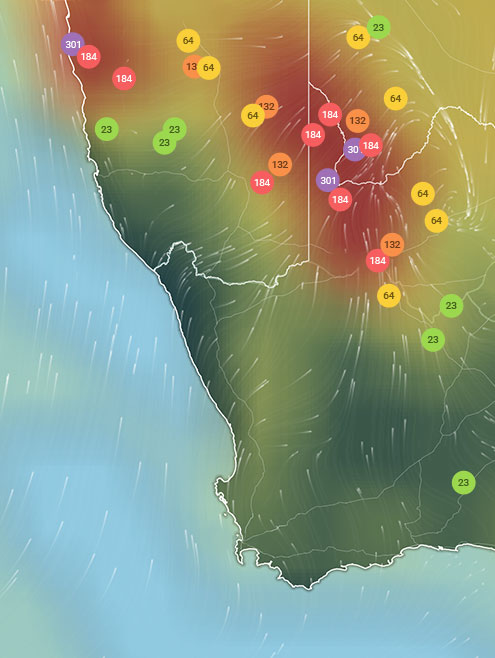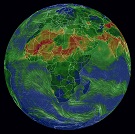Get a monitor and contributor to air quality data in your city.
4.2K people follow this city






AIR QUALITY DATA CONTRIBUTORS
Find out more about contributors and data sources| Weather | Broken clouds |
| Temperature | 80.6°F |
| Humidity | 81% |
| Wind | 4.1 mp/h |
| Pressure | 29.8 Hg |
| # | city | US AQI |
|---|---|---|
| 1 | Kuala Lumpur, Kuala Lumpur | 84 |
(local time)
SEE WORLD AQI RANKING
| # | station | US AQI |
|---|---|---|
| 1 | Kuala Terengganu | 65 |
(local time)
SEE WORLD AQI RANKINGUS AQI
65
live AQI index
Moderate
| Air pollution level | Air quality index | Main pollutant |
|---|---|---|
| Moderate | 65 US AQI | PM2.5 |
| Pollutants | Concentration | |
|---|---|---|
| PM2.5 | 18.6µg/m³ | |
PM2.5
x3.7
PM2.5 concentration in Kuala Terengganu is currently 3.7 times the WHO annual air quality guideline value
| Sensitive groups should reduce outdoor exercise | |
| Close your windows to avoid dirty outdoor air GET A MONITOR | |
| Sensitive groups should wear a mask outdoors GET A MASK | |
| Sensitive groups should run an air purifier GET AN AIR PURIFIER |
| Day | Pollution level | Weather | Temperature | Wind |
|---|---|---|---|---|
| Sunday, Apr 14 | Unhealthy for sensitive groups 109 AQI US | 87.8° 77° | ||
| Monday, Apr 15 | Moderate 69 AQI US | 86° 78.8° | ||
| Tuesday, Apr 16 | Moderate 56 AQI US | 86° 80.6° | ||
| Today | Moderate 65 AQI US | 87.8° 77° | ||
| Thursday, Apr 18 | Good 40 AQI US | 87.8° 77° | ||
| Friday, Apr 19 | Good 43 AQI US | 86° 77° | ||
| Saturday, Apr 20 | Good 49 AQI US | 86° 78.8° | ||
| Sunday, Apr 21 | Moderate 52 AQI US | 87.8° 77° | ||
| Monday, Apr 22 | Moderate 58 AQI US | 86° 77° | ||
| Tuesday, Apr 23 | Moderate 53 AQI US | 87.8° 77° |
Interested in hourly forecast? Get the app
Kuala Terengganu is a city located in the state of Terengganu, some 440km away from the capital city of Kuala Lumpur in Malaysia. It has a small size in terms of total area, but is densely populated, with over 402 thousand people living there (a number that will have grown exponentially since its last census taken in 2014). It was once a major fishing port for the region, with the port also doubling as a prominent trading location. Today it has moved over more into the manufacturing industry, with goods such as textiles, food and beverages, arts and crafts as well as even agricultural produce being its main export. However, tourism remains as one of its most important revenue streams, which can have a negative effect on the air quality due to the mass movement of people in and out of the city.
In 2019, Kuala Terengganu came in with a PM2.5 yearly average of 14.5 μg/m³, a reading that placed it into the ‘moderate’ air pollution ratings bracket. This requires a PM2.5 reading of anywhere between 12.1 to 35.4 μg/m³ to be classified as such. Whilst this is not a catastrophic level of air quality by any means, it is indicative that the city is subject to less than perfect qualities of air, and could do much to improve its year round readings. This reading of 14.5 μg/m³ also placed it in 1295th place out of all cities ranked worldwide, as well as in 35th place out of all cities ranked in Malaysia.
Much like the rest of peninsular Malaysia, Kuala Terengganu is subject to the same pollutive issues that afflict the majority of the country, albeit with a few differences regarding the year round ambient level of pollution, as well as not being subject to as much haze and smoke drifting over from the neighboring island of Sumatra. This shows that with the cities relatively high ranking out of all Malaysian cities, as well as a majority of the months coming in with fairly high PM2.5 readings, Kuala Terengganu has much of its pollution sources being locally produced.
One of these main sources would be that of vehicular emissions. With a growing population coupled with increased car ownership, the city would see a consistent rise in the level of vehicular pollution present. Numerous personal vehicles such as cars and motorbikes would inhabit the road, putting out large amounts of noxious chemicals and hazardous fine particulate matter such as PM2.5 or PM10. Larger vehicles often involved in industrial imports and exports such as lorries and trucks would be making their way in and out of the city, bringing with them large amounts of pollution that typically arise from vehicles that run on diesel fuels, and with their great weight and size figured in, their pollutive output is typically much larger than that of a singular vehicle of smaller size.
Besides cars and other vehicles being a prominent cause of pollution, others would be emissions from factories, which often rely on coal to provide their energy. As well as this, they often release industrial effluence (into both the water and soil as well as the air, depending on the level of control present in such facilities) related to whatever item or product is being manufactured. Other sources are construction sites, road repairs, the burning of wood and other organic material, as well as the occasional open burning of waste or refuse products, as well as smoke drifting over from the forest fires that occur in Indonesia, although as mentioned the city is far less affected by this occurrence due to its location.
Observing the levels of PM2.5 taken over the course of 2019, Kuala Terengganu saw its worst levels of pollution start early in the year, with a continued and sustained period of less than perfect pollution levels occurring from February, all the way up to the infamous month that all Malaysians have come to expect as being the worst month of the year, pollution wise.
The entire period of time between February and September all had months that came in with ‘moderate’ ratings of pollution, which is namely at 12.1 μg/m³ or above. These levels of pollution fluctuated up and down whilst staying within this moderate bracket, but a steady rise was witnessed during the months of July through to September, with PM2.5 readings of 16.5 μg/m³, 19.6 μg/m³ and then 23.5 μg/m³, making September the most polluted month of the year, and the prior months also having less than appreciable levels of air quality as the PM2.5 count steadily rose. In closing, the months of February through to September were when Kuala Terengganu had its worst period of pollution, hitting its peak in September before dropping down considerably.
As continued from the previous question, after the spike witnessed in September, the pollution levels dropped suddenly. After the PM2.5 high of 23.5 μg/m³ was seen, it went down to 11.8 μg/m³ in October, and then down further to 9.2 μg/m³ in November, putting the reading into the World Health Organizations (WHO's) target goal for the best quality of air at 10 μg/m³ or less, showing that November just managed to edge its way in.
December also presented with an equally appreciable reading of 11.1 μg/m³, putting it in the ‘good’ ratings category, which requires a reading of 10 to 12 μg/m³ to be classified as such. In closing, January also came in with a ‘good’ air quality reading of 10.5 μg/m³. This shows that the months of October through to January of the following year were the months with the best quality of air in Kuala Terengganu.
There are certain demographics among the population that for a number of reasons are particularly at risk to air pollution. These groups include one such as young children, who are prone to developing allergies and other related issues if over exposure to chemical contaminants occurs during their early developing phases, which can cause lasting physical and neurological impacts.
Another group would be the elderly, who are exceptionally at risk to respiratory ailments, which can sometimes lead to a higher mortality rate amongst the elderly population when the pollution levels go excessively high. Others include those with preexisting health conditions (particularly of the respiratory or cardiac variety) or those with compromised immune systems.
1Contributor
Government Contributor

1 station
1 Data source